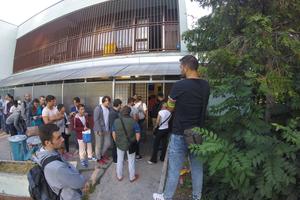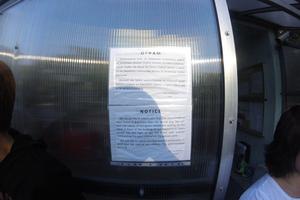Days and nights of waiting in Petržalka will be over once the department of Foreigners’ Police in Bratislava moves to its currently-prepared new location in Vajnory. The much-anticipated move could take place by the end of this year.
The sometimes two-day-long wait in front of Bratislava’s Foreigners’ Police department has become a heated issue among foreigners living in the capital in the past weeks again. Until recently, they also had to put up with the spread of unofficial waiting lists that brought yet more discord among the people queuing to get their residence permit or similar documents.
By now, police officers are checking people in the queue with camera to prevent circulation of the lists and notice potential mediators who make the queue instead of their (often numerous) clients at the time of issuing the order tickets. Foreigners agree that the officers finally stay there.
“Now the police intervene and do not let such people take the queuing tickets,” said Eduard, a lawyer whom The Slovak Spectator interviewed in front of the office in the Bratislava district of Petržalka on July 19, and who did not want to have his full name published. He confirmed that the lists were still on two weeks before. At that point, several foreigners contacted The Slovak Spectator or shared their experiences with the unorthodox practices in the queue on social networks.
In the official statement, the police described checks as measures to ensure public order, compliance with silent hours and monitoring. The measures should continue until the situation requires them, the Bureau of Border and Alien Police (UHCP) stated.
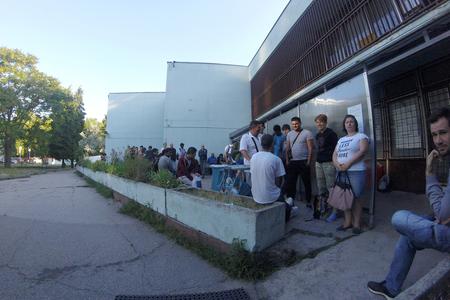
Foreigners grow in number
The police explain the queues by the department’s lacking capacity, growing number of applicants for permit and the time they needed to react.
“The problem is in the capacity and the real number of people who are interested in staying in Slovakia,” the director of the Bureau of Border and Alien Police (UHCP) Ladislav Csémi told The Slovak Spectator.
His office has been dealing with the problem of a steep increase in numbers of foreigners that exceed their capacities for about two years now, he said. In the first five months of 2017, the number of residence permit requests has increased in 41 percent in the year-on-year comparison. In general a 22-percent increase can be expected in half a year, compared to 2016, Csémi estimated.
Moving to a better place
The Bratislava department has been waiting to move to more accommodating premises to alleviate the situation at the police. In Petržalka, they have reconstructed part of the building where the offices for EU citizens are located now. In the non-EU section, they made some small changes, like a shelter for the queuing people and a barrier railing.
After several postponements Csémi expects the whole department will soon move to former military premises in the Vajnory district, located on the city outskirts to the east. Originally the move was planned for mid-2018, but Csémi now assumes they could be in Vajnory by the end of 2017.
“Now for the first time we very much hope that we will anticipate the reaction with the move to Vajnory,” Csémi said, adding that it is “rocket speed” for a state institution to get, reconstruct, and move to a new building within a year and a half.
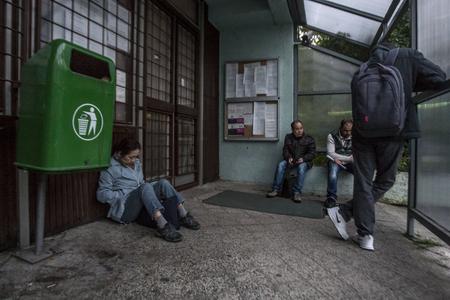
Will it be accessible?
Authorities chose the area due to prepared wiring network for information technologies in the building, adjacent storage spaces (which they need for the documentation that needs to be stored for many years), car park for clients and staff, and more service capacity by about 30 percent.
“Infrastructure of the new workplace would enable more fluent work of the department’s staff,” Csémi told The Slovak Spectator.
However, one of the most criticised aspects of the new location at the Regrútska Street in Vajnory is practically unknown to foreigners, and hardly accessible. Currently only one bus No. 65 from Vrakuňa to Rača connects the area with other city districts.
“Our counter-argument is that a foreigner is able to find a monument in a forest,” Csémi said when asked whether the remote location of the office will not cause problems for clients who might easily lose their way. “In the world today I google Regrútska 3 and it comes up.”
UHCP claims they plan to negotiate with the respective municipal authorities about additional public transport lines in the future.
Csémi also promises other changes for more smooth operation of the department including relocation of marginal activities to departments in adjacent cities and special care for families with children that have priority in getting permits even now.
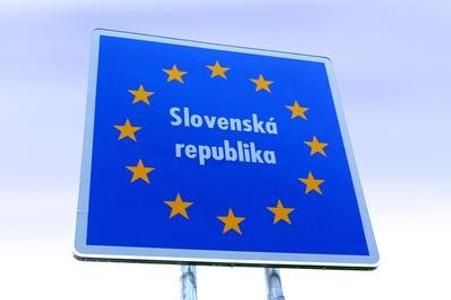
Unofficial waiting lists
For the moment, still in Petržalka, the queuing system at the department works with the queuing machine that issues numbered tickets, just like at other Slovak offices. However, the limited capacity of the department limits the number of people who get the tickets issued in one day, and some line up in the queue for the tickets through day and night.
The police officers open the doors to the room with the ticket machine exactly at 7:30, the official opening time of the office. That way, laggards who try to avoid the queue have no chance to get the ticket.
The unofficial waiting lists that have appeared in the past few months, on scrap papers, were an attempt to avoid the official system and secure those on the list the spot for the next day.
Foreigners who came to the department on July 19 confirmed the existence of the lists.
“The lists contained names of people who had to report their presence every three hours,” Serbian citizen Nemanja, who did not want to have his surname published, said. He did not sign the list, but managed to get his number out of the queuing machine the day before. He waited through the night to get his documents handled in the morning.
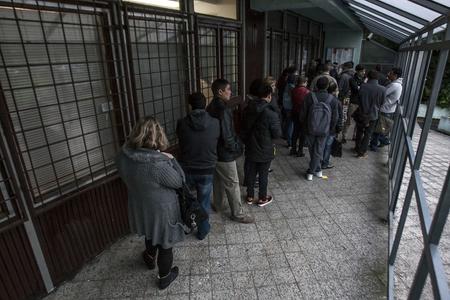
Various groups and mediators have started making a business out of the desperate queuing situation. Some of them wait through the night and in the morning, just before the room opened, they called their clients and moved them to good spots in the queue. The Slovak Spectator directly witnessed one such case on July 19.
Foreigners in the queue and on Facebook report that such service could cost between €50 and €80.
People should report situations
What can the clients of the Foreigners’ Police department in Bratislava do when faced with such unofficial lists and various mediators that rig the queues?
The UHCP says that the police cannot really intervene in all cases, as some occur in public spaces.
“I cannot intervene against a foreigner or a Slovak citizen who at first sight did not do anything wrong,” Csémi said. “If I did that, we would be sitting here answering questions why the police used force inappropriately.”
For the time the department remains in Petržalka, experts from the International Organisation for Migration (IOM) recommend to the clients waiting in the queue who want to act within the law not to pay the fees to intermediaries and report all suspicious situations to the police.
“If they feel that the police officers themselves do not act in accordance with the law, they have the opportunity to file a complaint with the inspection of the Interior Ministry,” Zuzana Vatráľová, head of the IOM in Slovakia, told The Slovak Spectator.



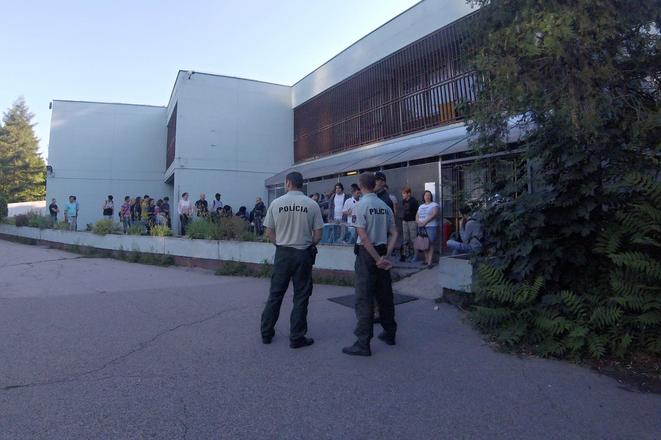 Police officers are watching people in the queue in front of Bratislava’s Foreigners’ Police department. (source: Peter Adamovský)
Police officers are watching people in the queue in front of Bratislava’s Foreigners’ Police department. (source: Peter Adamovský)

